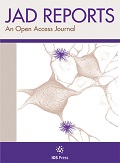Authors: Moon, Sung Seek | Anderson, Lindsey | Liu, Jinyu | Lee, Jinwon | Moon, Youngkwang
Article Type:
Research Article
Abstract:
Background: Alzheimer’s disease (AD) poses a growing public health challenge, particularly with an aging population. While extensive research has explored the relationships between AD, socio-demographic factors, and cardiovascular risk factors, a notable gap exists in understanding these connections within the Asian American elderly population. Objective: This study aims to address this gap by employing the Classification and Regression Tree (CART) approach to investigate the intricate interplay of socio-demographic variables, cardiovascular risk factors, sleep patterns, prior antidepressant use, and AD among Asian American elders. Methods: Data from the 2017 Uniform Data Set, provided by the National Alzheimer’s
…Coordinating Center, were analyzed, focusing on a sample of Asian American elders (n = 4,343). The analysis utilized the Classification and Regression Tree (CART) approach. Results: CART analysis identified critical factors, including levels of independence, specific age thresholds (73.5 and 84.5 years), apnea, antidepressant use, and body mass index, as significantly associated with AD risk. Conclusions: These findings have far-reaching implications for future research, particularly in examining the roles of gender, cultural nuances, socio-demographic factors, and cardiovascular risk elements in AD within the Asian American elderly population. Such insights can inform tailored interventions, improved healthcare access, and culturally sensitive policies to address the complex challenges posed by AD in this community.
Show more
Keywords: Alzheimer’s disease, Asian American, classification and regression tree, National Alzheimer’s Coordinating Center
DOI: 10.3233/ADR-230162
Citation: Journal of Alzheimer's Disease Reports,
vol. 8, no. 1, pp. 517-530, 2024





